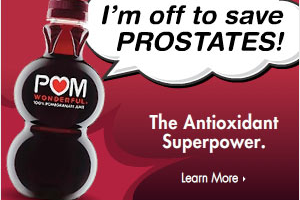FTC says no to POM Wonderful advertising claims
The newly alive Federal Trade Commission (FTC) says POM Wonderful must stop making unscientific claims for the health benefits of pomegranate juice. POM juice, the FTC says, has not been shown to prevent or treat heart disease, prostate cancer, or erectile dysfunction, as the company claims:
- “SUPER HEALTH POWERS! … 100% PURE POMEGRANATE JUICE. … Backed by $25 million in medical research. Proven to fight for cardiovascular, prostate and erectile health.”
- “NEW RESEARCH OFFERS FURTHER PROOF OF THE HEART-HEALTHY BENEFITS OF POM WONDERFUL JUICE. 30% DECREASE IN ARTERIAL PLAQUE … 17% IMPROVED BLOOD FLOW … PROMOTES HEALTHY BLOOD VESSELS … ”
- “Prostate health…You have to be on pomegranate juice. You have a 50 percent chance of getting [prostate cancer]. Listen to me. It is the one thing that will keep your PSA normal. You have to drink pomegranate juice. There is nothing else we know of that will keep your PSA in check. … It’s also 40 percent as effective as Viagra.”
- Clinical studies prove that POM Juice prevents, reduces the risk of, and treats, erectile dysfunction.
The complaint cites advertisements in the Washington Post and Fitness magazine, as well as  this ad:
this ad:
According to the New York Times account, the POM Wonderful folks are not taking this lightly. They have spent a reported $34 million on research to “prove” that POM has antioxidant activity.
But I could have told them that before they spent a dime! All fruits and vegetables have antioxidant activity.
I love using POM research as an example of how easy it is to design studies to give you the answer you want. POM research demonstrates that pomegranate juice has antioxidant activity and acts as an antioxidant in the body. Of course it does.
But so does every other fruit and vegetable and what this research does not do is compare the effects of pomegranate juice to those of orange juice, for example. That’s the issue I talked about in my November 19, 2007 post titled “The (silly) battle of the antioxidants.”
Which fruit has the most antioxidants? The latest report says blueberries, followed by cranberries, apples, red grapes, and finally green grapes. What? Pomegranates don’t even make the top five? In this case, who knows? The investigators were testing a new assay method and those were the only fruits they examined.
And then there is the troubling matter of whether antioxidants make a demonstrable difference to health. The European Food Standards Agency has been turning down health claims for antioxidants like mad. As I discussed on April 16, 2009:
Here’s another example from the pomegranate folks. They do brilliant advertising, but this time the British are complaining that these marketers went too far when they posted billboards stating that pomegranate (“antioxidant powerhouse”) juice will help you cheat death. The British advertising standards agency balked. Here too, pesky science gets in the way. Studies not only fail to support a benefit of antioxidants but sometimes show harm.
If only that pesky science weren’t so inconvenient, marketers could do as they please. The New York Times reports that the POM folks are not taking this lightly. They are suing the FTC—not because they are claiming they have science on their side, but because they think their health claims, believable or not, are protected by the First Amendment.
Did our founding fathers really introduce the First Amendment to protect the right of marketers to make unsubstantiated health claims? Do our judges really believe this? Is this a good case for taking on this question. Lawyers: get to work!

